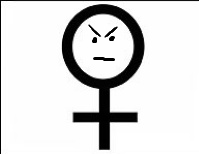In a desperate attempt to get past the tedious arguments that keep hampering our progress in actually Getting Shit Done, I’m going to say this, and then every time it crops up again I can whap this out and be all like “ta-da! Here’s my opinion, now I’m going to go back to bed.”
Today it’s Lily Allen putting out a music video that women of colour feel reflects another manifestation of white supremacy. Yesterday it was some other music video, the day before it was a newspaper column, and before that it was a thing on telly, and basically what I’m saying is these arguments happen again and again. It goes like this:
- Pop culture thing happens.
- Privileged people like it.
- People without privilege criticise it from their perspective and call it problematic.
- Privileged people who like it get upset.
- Privileged people who like it think the criticism is some sort of personal attack.
- Privileged people who like it declare the thing to be Not Problematic.
- Ranks close. Nothing changes.
I was once one of the people who lathered, rinsed and repeated steps 4-7, so I can see exactly how it happens. It’s nice to enjoy something. It makes you feel good. And you’re a nice, good person. Also, racism and transmisogyny and sexism and ableism and bourgeois dickholery are generally pretty awful. So, it logically follows that because you and the way you feel are good, and oppression and supremacy are bad, the thing you like can’t be any of those things.
Except that’s not how it works. That thing you liked? It’s not a part of you. You almost certainly, in fact, had no creative control over it. Instead, it was created by rich and privileged people, far far away. Chances are, they’re not big evil hood-wearing KKK members either. They fucked up, because privilege kind of does that.
The people who are criticising it are those who have to experience oppression. This means they’re a hell of a lot better at spotting it than privileged people. They are probably right here, far more likely to be right about this than you, the fan.
So do you need to stop liking that thing you like? Hell no. I recommend you read this excellent guide: “How To Be A Fan Of Problematic Things”, which guides you through the process of actively critiquing pop culture, starting from this position:
Liking problematic things doesn’t make you an asshole. In fact, you can like really problematic things and still be not only a good person, but a good social justice activist (TM)! After all, most texts have some problematic elements in them, because they’re produced by humans, who are well-known to be imperfect. But it can be surprisingly difficult to own up to the problematic things in the media you like, particularly when you feel strongly about it, as many fans do. We need to find a way to enjoy the media we like without hurting other people and marginalised groups.
So please, please, please let’s stop having this wearing argument. While liking something problematic doesn’t make you a shit, having this argument pisses people off. It pisses off the marginalised voices we need to hear more of in feminism. It pisses off people who are subject to oppressions. It pisses off everyone who’s had to sit through this nonsense more than once–on both sides.
Let’s just listen to what’s being said, understand it and engage with it, and then enjoy our favourite things with a more critical eye.

Don’t forget the every popular “Oh, you are just being a rage blogger, it isn’t like you have anything new to say!” argument.
Liked this article. Recently asked a few people what their favourite problematic TV shows were. I went for Suits which has snappy dialogue which I like and some really dodgy anti-semitic stuff which I don’t like.
Thanks for writing a go-to argument that I can direct people to the next time I find my self having this argument (again).
Can we post this article in glowing neon at the entrance of Twitter? Absolutely awesome breakdown of an issue reenacted everyday online.
“Let’s just listen to what’s being said, understand it and engage with it, and then enjoy our favourite things with a more critical eye.” – Well put.